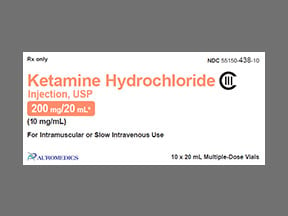
Ketamine Coupons & Savings Card – Discount Prices from $1.01
Generic for: Ketalar, Praketamide
My prescription
Edit
5ML of 10MG/ML, Ketamine (1 Plas Cont)
Select pharmacy

CVS
$23.25
COUPON PRICE
Walmart
$1.01
COUPON PRICE
Albertsons
$8.59
COUPON PRICE
Walgreens
$8.75
COUPON PRICEKetamine savings card
Show this card to your pharmacist
Walmart
$1.01
BIN
ID
PCN
GRP
019876
LH0A0D850B
CHIPPO
LHX
Powered by
Price history for Praketamide (brand) & Ketamine (generic)
1 Plas Cont, 20ML of 10MG/ML
Average retail price for Praketamide
Average retail price for Ketamine
Average SaveHealth price for Ketamine
Our price history data is based on aggregated prescription data collected from participating pharmacies in America. Our prescription data updates daily to reflect the latest price changes. If you notice a missing data point, it means there wasn't sufficient data available to generate a monetary value for that date.
We analyzed Ketamine prices for (20ML of 10MG/ML, 1 Plas Cont) over the last 12 months. The average retail price was $67.30, while the average price using the SaveHealth discount card was $13.80. That's a savings of approximately 79.49% when using our Ketamine coupon.
Compared to the generic version, Praketamide had an average price of $616.99 over the same time period. With the SaveHealth savings card, Ketamine is 97.76% cheaper on average than Praketamide.
*Retail prices are based on pharmacy claims data, and may not be accurate when we don't have enough claims.
Ketamine dosage forms
Dosage Quantity Price from Per unit 10ML of 50MG/ML 1 Vial $1.16 $1.16 10ML of 50MG/ML 2 Vials $7.30 $3.65 10ML of 50MG/ML 3 Vials $12.24 $4.08 10ML of 100MG/ML 1 Vial $11.09 $11.09 10ML of 100MG/ML 2 Vials $14.68 $7.34 10ML of 100MG/ML 3 Vials $18.27 $6.09 20ML of 10MG/ML 1 Vial $11.84 $11.84 20ML of 10MG/ML 2 Vials $16.19 $8.10 20ML of 10MG/ML 3 Vials $20.53 $6.84
| Dosage | Quantity | Price from | Per unit |
|---|---|---|---|
| 10ML of 50MG/ML | 1 Vial | $1.16 | $1.16 |
| 10ML of 50MG/ML | 2 Vials | $7.30 | $3.65 |
| 10ML of 50MG/ML | 3 Vials | $12.24 | $4.08 |
| 10ML of 100MG/ML | 1 Vial | $11.09 | $11.09 |
| 10ML of 100MG/ML | 2 Vials | $14.68 | $7.34 |
| 10ML of 100MG/ML | 3 Vials | $18.27 | $6.09 |
| 20ML of 10MG/ML | 1 Vial | $11.84 | $11.84 |
| 20ML of 10MG/ML | 2 Vials | $16.19 | $8.10 |
| 20ML of 10MG/ML | 3 Vials | $20.53 | $6.84 |
